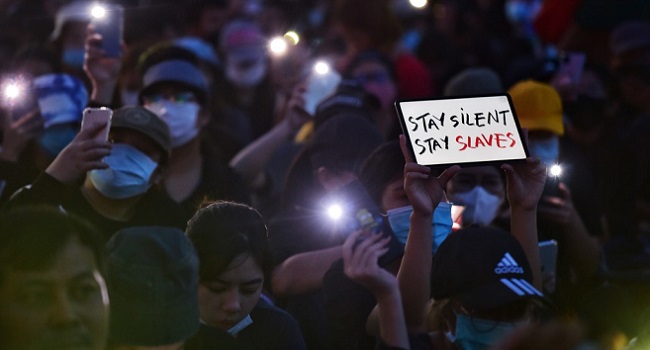Thailand’s premier on Tuesday played down the spread of the country’s democracy movement to high schools where students have been raising a three-fingered salute as a protest symbol against the military-aligned government.
The country has seen near-daily protests in recent weeks by university students demanding the resignation of Prime Minister Prayut Chan-O-Cha and a frank discussion of the role of the unassailable monarchy.
Their demands have gained traction among a broad demographic and a protest in Bangkok on Sunday drew more than 10,000 people — the largest political gathering since former military chief Prayut came to power in a 2014 coup.
This week the movement has taken hold in high schools where teenagers have been holding up three fingers each morning as the national anthem plays, according to Twitter posts with the hashtag #badstudent that have gone viral.
“All I see are the innocent intentions of the students,” premier Prayut said Tuesday, claiming the youngsters were being peer-pressured into joining.
“I heard from students that some don’t want to join but they are being bullied.”
Protesters are calling for an overhaul of Prayut’s government, a rewrite of the constitution and the abolition of a controversial royal defamation law.
The law shields Thailand’s super-rich King Maha Vajiralongkorn from criticism and carries a sentence of up to 15 years in jail per charge.
After Sunday’s massive protest, the hashtag campaign “Tie a white bow against the dictator” started trending on Twitter.
Images of high school students with white ribbons on their hair, wrists and backpacks proliferated.

But there have also been allegations of intimidation and harassment of pupils levelled against school staff and plainclothes police.
The United Nations agency overseeing child rights on Tuesday issued a statement voicing “concern” about the “potential harm” children could be facing.
“UNICEF urges all actors to ensure that children and young people… are able to voice their opinions peacefully about issues that affect their present and future, without fear or intimidation,” the statement said.
National Police spokesman Krissana Pattanacharoen called the allegations of harassment “rumour” but encouraged students to file any legal grievances.
“If there is strong evidence… you are entitled to bring legal action against them,” he told AFP.
Legal aid group Thai Lawyers for Human Rights issued an online form encouraging students to lodge complaints anonymously.
AFP

















